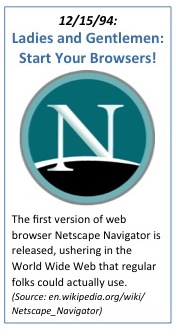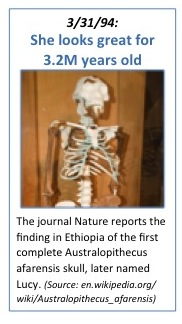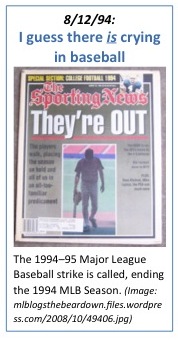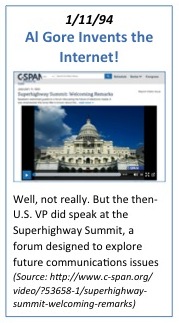TPO’s Consultants Discuss the Increasing Impact of HR on “The Business,” the Emergence of Collaborative Leadership and Working at TPO
September 10th, 2014
Written by: TPO
This interview is part of a yearlong retrospective blog series commemorating TPO@20! —TPO’s 20th Birthday. This month we are featuring reflections and observations by 11 of TPO’s consultants on what has changed in “how we work”—and what hasn’t—over the last two decades.
In 1994, Netscape introduced the browser and America Online provided Internet access. Do you remember the first thing you did on the World Wide Web?
 “Visited a professor’s ‘web page,’ which had an online syllabus. I looked up his email address and sent him a question on email which was much easier than attending his office hours.” – Leyla Hurt
“Visited a professor’s ‘web page,’ which had an online syllabus. I looked up his email address and sent him a question on email which was much easier than attending his office hours.” – Leyla Hurt
“Waited for painfully slow downloads…AND that obnoxious sound of the dial up connection process.” – Mary Mason
“I shared recipes with my Mom and Dad.” – Ann Osten
“I’m sure that it was something to do with HR, possibly SHRM, as I was dedicated to learning as much as I could about HR.” – Joanna Hopler
In terms of changes in your industry that have had a significant impact on how you work, what’s the first thing that comes to mind?
“24/7 access to information, high speed internet and smart phones.” – Lidia Kasiak
“The incredibly fast evolution of technology. And the focus shifting to understanding the business vs. pushing paper or being the policy police.” – Claire M. Burns
“HR was overhead that used to be the keeper of rules and employment information. Now HR is a strategic business partner helping to impact the business based upon it’s mission and goals.” – Katherine Sigler
“Having everything online and going paperless—I’m very grateful! I hate paper.” – Leyla Hurt
“Increased level of respect and representation.” – Jan Taylor
“Working from home.” – Trudy Van Zee
“Instant access to information and electronic storage.” – Cindy Winters
Has the increase in real-time, always-on communications been a positive thing—or not so positive?
“It’s a double-edged sword with both advantages and disadvantages. Although I think the advantages outweigh the disadvantages…most of the time.” – Claire M. Burns
“It creates the need for instant gratification. It has blurred the lines and boundaries of work hours and how quickly one needs to reply.” – Katherine Sigler
 “Positive: Greater efficiencies in getting things done, especially across significant time and logistical distances. Not so positive: You can rush a situation to precipitous decision-making. And email will never adequately take the place of true face to face communications.” – Mary Mason
“Positive: Greater efficiencies in getting things done, especially across significant time and logistical distances. Not so positive: You can rush a situation to precipitous decision-making. And email will never adequately take the place of true face to face communications.” – Mary Mason
“The ability to work anywhere anytime (both a positive and negative). Just because we can work 24/7 doesn’t mean we should.” – Cindy Winters
“Both. Positive for sure because you can answer questions in a timely manner, it’s easier to multi-task, so many resources are available at your fingertips (literally). It’s not so positive because people have a hard time pulling away.” – Leyla Hurt
Name something about “how we work” that hasn’t changed in the last two decades.
“People and economics are still unpredictable.” – Claire M. Burns
“HR is about people and talent. That has not changed.” – Katherine Sigler
“People issues can still be messy.” – Mary Mason
“Passion for what we do and the desire to make a difference through what we do.” – Cindy Winters
“We still need to build relationships, and the best ones are built face to face.” – Trudy Van Zee
“What hasn’t changed for me is the support and voice that HR practitioners offer to employees. The second would be the flip side of that…supporting and protecting the organization that we work for.” – Joanna Hopler
Thinking back 20 years, what was your definition of Human Resources then and what is it now?
| HR in 1994 | HR in 2014 |
| “If you were in HR back then you were a ‘people person.’” | “Now you’re a ‘business person.’” – Claire M. Burns |
| “HR used to be a function.” | “Now it is a strategy!” – Katherine Sigler |
| “While some of us were already beginning to think about HR being strategic as well as transactional, we hadn’t wrapped our minds around exactly what that meant and weren’t able to effectively articulate the business impact of HR—partially because we were still often ‘speaking’ HR instead of speaking business. We were looking for a ‘seat at the table’ (such a trite phrase!) before we became fluent in the language of the other table participants.” | “Twenty years later conversations with CEOs and Executive Directors start with the business impact of HR initiatives and focus on integration and support of overall strategic goals.” – Cindy Winters |
| “20 years ago HR was just administration.” | “While there will always be that administrative piece, HR has evolved to finally being a part of the business a respected partner. And I have had the blessing to have had roles that live up to those terms. I’ve gone from an administrator of HR functions to a business partner that can actually show quantified business result for my actions.” – Joanna Hopler |
| “HR then was the people behind the scenes that I didn’t really think about much unless I needed them. I probably asked one or two questions a year!” | “Now HR is really a vital strategic partner for the business or organization. People are at the heart of every organization no matter how big or small and no matter what you do. It’s vital that you get that strategy right.” – Leyla Hurt |
| “HR was transitioning a compliance and paper-driven presence.” | “Now it’s a strategic partner in organizational development and resource management.” – Jan Taylor |
What was the definition of leadership 20 years ago? Has it changed?
| Leadership in 1994 | Leadership in 2014 |
| “The outdated definition of leadership was the ability to influence others to do what you want them to do.” | “Leadership is not only the ability to get people to do what needs to be done but it encompasses the multiple characteristics and abilities of the person to be successful in influencing a positive result through others.” –Joanna Hopler |
| “More top down.” | “More visionary and collaborative now.” – Claire M. Burns |
| “Leadership was very directive with no questions asked when I first started out.” | “Now, leadership is more about collaboration.” – Leyla Hurt |
| “Hierarchical title-generated leadership.” | “Leadership emanating from expertise and results, which has markedly changed the dynamic and culture of those organizations. Millennials in particular won’t wait around for years to achieve the right title and rank before being recognized for their expertise and leadership abilities.” – Cindy Winters |
| “I think it was structured in a hierarchical fashion where management knows best.” | “Now it seems that there is more of a roundtable approach— collaborative effort.” – Ann Osten |
What’s else that stands out that’s different today from how you did business in 1994?
“More data is available faster, can be synthesized easier and presented in a myriad of ways.” – Katherine Sigler
 “Global expansion—the rise of India and of the emerged and emerging markets.” – Trudy Van Zee
“Global expansion—the rise of India and of the emerged and emerging markets.” – Trudy Van Zee
“My confidence and sense of empowerment are stronger now than they were in that more rigidly structured environment.” – Mary Mason
“Thinking globally and the speed of change.” – Cindy Winters
“As a general rule, management is more approachable and flexible; policies are more relaxed and balanced (in most companies anyway).” – Claire M. Burns
What impact has TPO had on your career? Your life?
“TPO has been giving me opportunities to grow and broaden my experience in the field at a much faster pace than an in-house HR department. There are a variety of projects on an every day basis, and collaboration with experienced professionals. On a personal front, I appreciate the flexibility to work on different schedules and remotely.” – Lidia Kasiak
“Working at TPO allows me to apply what I’ve learned, earn a wage and have personal flexibility. There’s less stress than the corporate grind I was in, although there still are moments of intensity.” – Claire M. Burns
“TPO has allowed me to strategically apply my HR knowledge and expertise creatively to multiple clients based upon their business needs.” – Katherine Sigler
“TPO has given me great flexibility, which I truly value, while also giving me the opportunity to work with clients where I know I can have an impact. It’s the best of a win-win scenario.” – Leyla Hurt
“TPO has given me an opportunity to have a significant role at respected entities while maintaining less than full time hours, which is important to me. TPO has long-term relationship with clients, and I have been lucky enough to work for one of those that spans beyond five years. The relationship that I observe between the client and the leadership of TPO is impressive and always gives me the sense that I am working for the ‘right’ employer.” – Joanna Hopler
“At TPO I have had a chance to make a big contribution as a strategic thought leader.” – Trudy Van Zee
 “TPO has allowed me to learn how to work with individuals who exhibit a wide variety of management styles. It has allowed me at retirement age to step back but not out and to continue to have a sense that I’m contributing. My schedule gives me time to do wonderful grandmother things! I’ve loved all 8.75 years of it.” – Mary Mason
“TPO has allowed me to learn how to work with individuals who exhibit a wide variety of management styles. It has allowed me at retirement age to step back but not out and to continue to have a sense that I’m contributing. My schedule gives me time to do wonderful grandmother things! I’ve loved all 8.75 years of it.” – Mary Mason
“It’s been a pleasure working for an organization that encourages innovative strategic thinking, collaboration, and personal growth.” – Cindy Winters
“TPO has offered me the opportunity to use many of my HR skills in a wide variety of settings. The staff is incredible.” – Jan Taylor
“TPO has opened me up to the workings of the non-profit and association world. It has helped me continue to be a part time employee and yet have colleagues I can rely on for support. I am able to keep my personal pursuits on track while helping support my family.” – Ann Osten


Leave a Reply